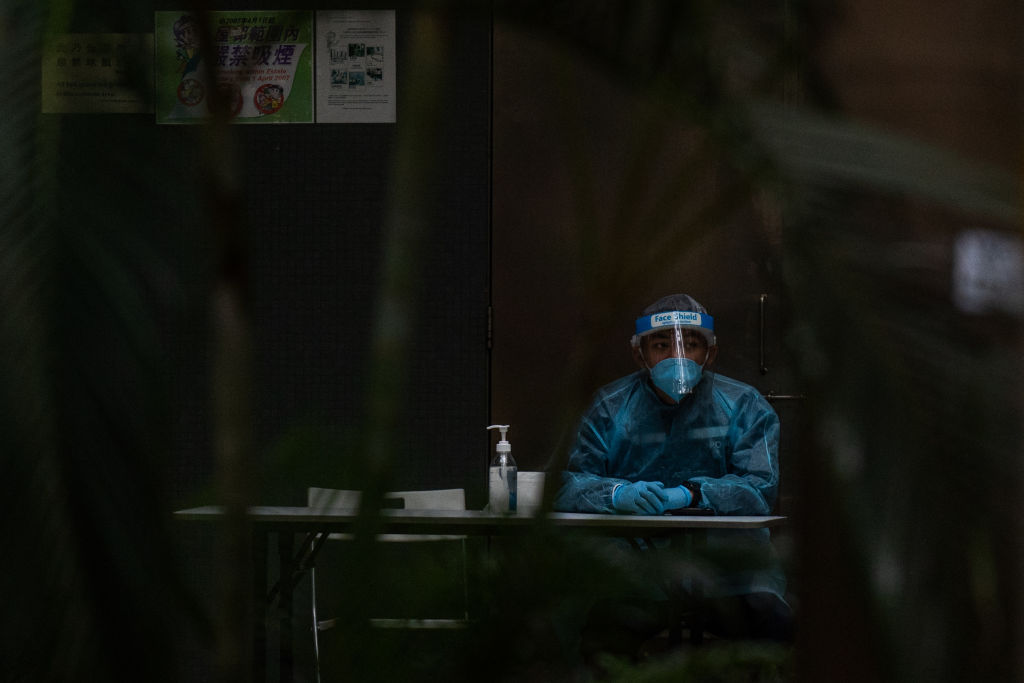
Hong Kong’s zero-tolerance approach to Covid-19 could keep the Asian financial hub cut off from most of the world until 2024 and fuel a large-scale exodus of international workers and executives, according to a draft report by the European Chamber of Commerce in the city.
The most likely scenario for Hong Kong’s exit from its isolation is to wait for China to finish developing a powerful messenger RNA vaccine and immunize its 1.4 billion people, the business group said in an internal document seen and verified by Bloomberg.
A reopening could then happen late next year or early 2024, the document said, adding that companies should prepare for Hong Kong to remain “semi-closed” to international travel.
“We anticipate an exodus of foreigners, probably the largest that Hong Kong has ever seen, and one of the largest in absolute terms from any city in the region” in recent history, the report said.
That would make Hong Kong less diverse and less appealing to international firms, and eventually limit its potential to contribute to China’s economy, the report said, adding that global companies should plan to have regional offices in other Asian cities instead of the former British colony.
It’s unclear whether the European Chamber’s assessment will change in the final version of its report. The draft said the report consolidated insights from “a few sessions organized with different parties” over the past few months, without providing further details on the information used to formulate its scenarios.
A spokeswoman for the European Chamber declined to comment.
The warning comes as Hong Kong imposes near-lockdown conditions and bans flights from eight places, including the U.S. and U.K, to fight an omicron outbreak. The city’s Covid-Zero approach means an aggressive response to a minute number of cases by global standards, even as the rest of the world is adjusting to living with the virus amid high vaccination levels.
Flight bans and mandates of up to 21 days in quarantine for travelers have stranded high-ranking financial executives outside the city and made it harder for global firms to hire top talent.
Waiting for China
The report also walked through other scenarios, including the possibility that an uncontrolled outbreak in China would derail any effort to open the border between Hong Kong and the mainland. Then the city would have to wait for China to control the outbreak, or abandon the zero tolerance approach and begin reopening on its own.
This scenario could play out within 12 months of an uncontrolled outbreak in China, the report said, and also result in the city delaying its reopening until 2023 or 2024.
In another possible outcome, Hong Kong itself could experience an uncontrolled outbreak, with the government responding by imposing severe restrictions surpassing those the city has seen thus far. Those could include widespread lockdowns, even tighter border closures and food shortages, the report said.
20,000 Deaths
That scenario could result in as many as 20,000 deaths among Hong Kong’s elderly, the report said, since vaccination rates among seniors are much lower than the rest of the population.
The least likely scenario is that Hong Kong and China both adhere to their Covid Zero approaches for the foreseeable future and don’t open to the rest of the world. China would then continue with its internal focus and Hong Kong would become a “collateral casualty” stuck between its dependency on the mainland and its role as an international city.
The document was designed to help international businesses determine how to prepare for the future in Hong Kong.
With travel curbs likely to last for the next one to three years, businesses need to focus on retaining talented and skilled workers, the report recommended.
More Must-Reads from TIME
- Why Biden Dropped Out
- Ukraine’s Plan to Survive Trump
- The Rise of a New Kind of Parenting Guru
- The Chaos and Commotion of the RNC in Photos
- Why We All Have a Stake in Twisters’ Success
- 8 Eating Habits That Actually Improve Your Sleep
- Welcome to the Noah Lyles Olympics
- Get Our Paris Olympics Newsletter in Your Inbox
Contact us at letters@time.com